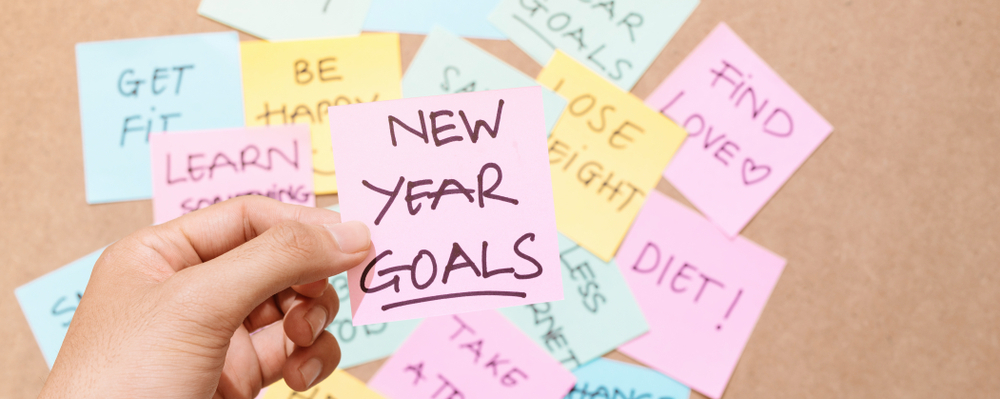January Blues
Posted on 27th January 2020
The festive period arrived, as usual without much warning, leaving us no time to plan or pace ourselves. We rushed to shop, wrap, decorate, cook and entertain – my goodness it took a toll. Then as the New Year approached, we reflected on the old, decided what to leave behind in 2019 and made resolutions for the New Year, New Decade … maybe even New me.
Determined to be slimmer, fitter, happier and wealthier or variations of these themes, we made a pact with ourselves; this time it’s for real. With uplifted spirits and an enthusiasm for the New Year, we said goodbye to the old year … off we go, this year will be great and it’s a new decade so even better.
And then the reality set in, as we return to the usual daily routine the enthusiasm for the bright shiny future we could see on New Years Eve fades. With each routine task it becomes clear that it’s the same life, same problems and challenges. The only thing different is the date.
In 2005, Psychologist Cliff Arnall issued a press release saying that January 20th was the most depressing day of the year. He calculated this by using several factors such as weather, debt and motivational levels. A formula was devised to consider these factors, however, the equation and the pseudo science has been widely criticised.
I am writing this not to undermine your resolve, but to emphasise that our thoughts, feelings and actions are complex and interconnected. To make a change to your life that is meaningful, sustained and obvious to you and those around you takes significant effort, practice and resilience. If you were facing challenges in your life prior to the festive period, whether they are financial, social or health related, unless something significant has happened to positively change the situation, a period of intense spending, eating, drinking alcohol and socialising is more than likely going to have added to the problem not alleviated it.
In my work, I see people at this time of the year who feel desperate. They have invested energy, time and money in making their Christmas celebrations great, thinking that it will soothe their pre-Christmas distress, repair their relationship or validate their standing as a good wife/husband etc.
The intensity of the desperation varies from person to person. As with all human situations, our feelings are there to guide us. All of our emotions serve a purpose and the degree, intensity and frequency in which we feel can indicate if, what and how we should act. Often whilst in the eye of a “desperation storm” the solution cannot be seen, perspective is lost to despondency and feelings of being helpless and hopeless emerges.
With Blue Monday just behind us, are you:
Slipping into feeling despondent?
Struggling to find that positive quote that will make you feel better.
Trying really hard and feel like you’re getting nowhere?
Not sure what to do?
Worrying?
Finding to hard to concentrate and remember things?
Feeling tired?
I am sorry to say, there is no magic wand, no instant cure and the suggestion there is a simple way to solve these problems, I believe, is a disservice to the effort the person has already made. I firmly believe there comes a time in our lives when we have to take a hard look at where we are, what we want and how we are going to get there.
As we live our lives we learn how to do many things very well, we become skilled and experienced, productive and efficient. But we also pick up bad habits on the way and learn how to do those well. Habits that may be harmful to us from a health and wellbeing perspective or sabotaging our efforts in work or relationships.
I am not promoting quick fix activities; no thinking a happy thought and the world will be fine from me. I firmly believe that for us to be as happy and healthy as we can be, a consistent and robust approach to managing ourselves is the way forward. This approach requires us to look at ourselves in an honest and kind way. To accept our life experiences, faults and learning in a way that is helpful to building our confidence, self esteem and courage.
This approach is called compassion. It involves adopting these principles into your daily life. By that I mean, take the time to consider how you think act and feel when you deal with others and when you talk to your self. It takes time and practice, the more you do it the easier it gets. So ask yourself this question … Do I treat myself with compassion? … the definition is below:
Kindness
Understanding
Respect
Wisdom
Courage
Strength
If not, perhaps consider trying to introduce some kindness into your self talk. Think about stopping things you know are not doing you any good. Maybe practice saying NO and putting yourself first.
You are the only person who will be with yourself for the whole of your life, you deserve to treat yourself with compassion.
I’d love to hear your views on this.
Book a FREE initial consultation
- Does Hypnosis Work for Phobias? Posted on 23rd November 2023 at 10:45
- Women's Awards (East Midlands) Posted on 25th September 2023 at 15:01
- Does Hypnotherapy Really Work? Posted on 16th August 2023 at 14:01
- Understanding Panic Attacks: A Holistic Approach to Managing Anxiety Posted on 17th July 2023 at 14:55
Share this post:


